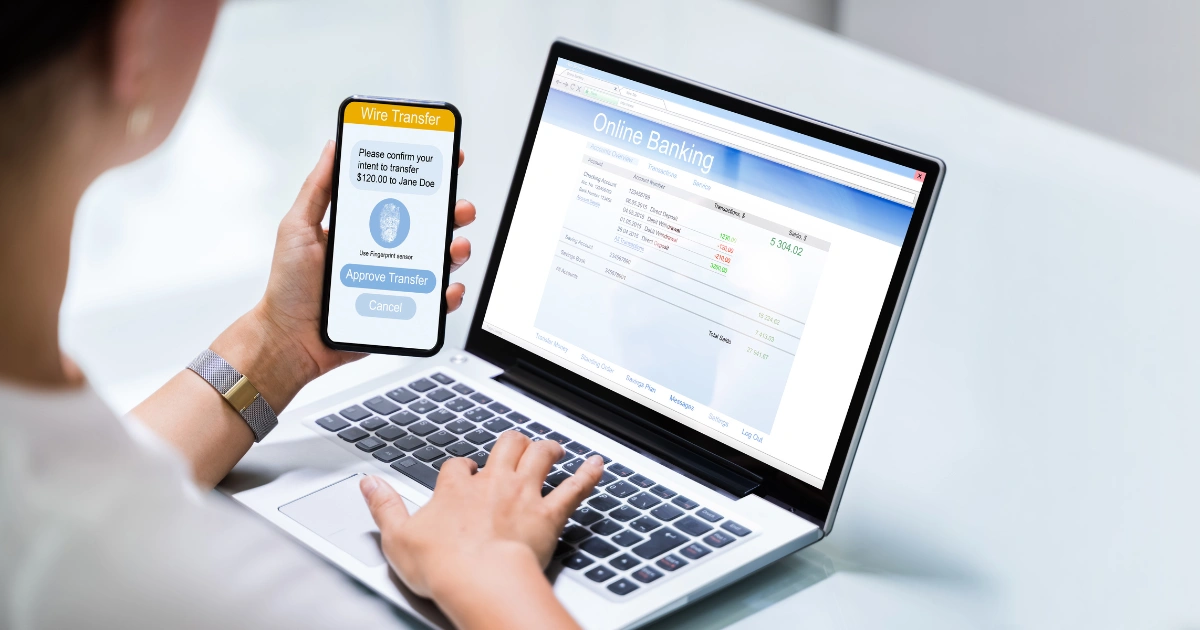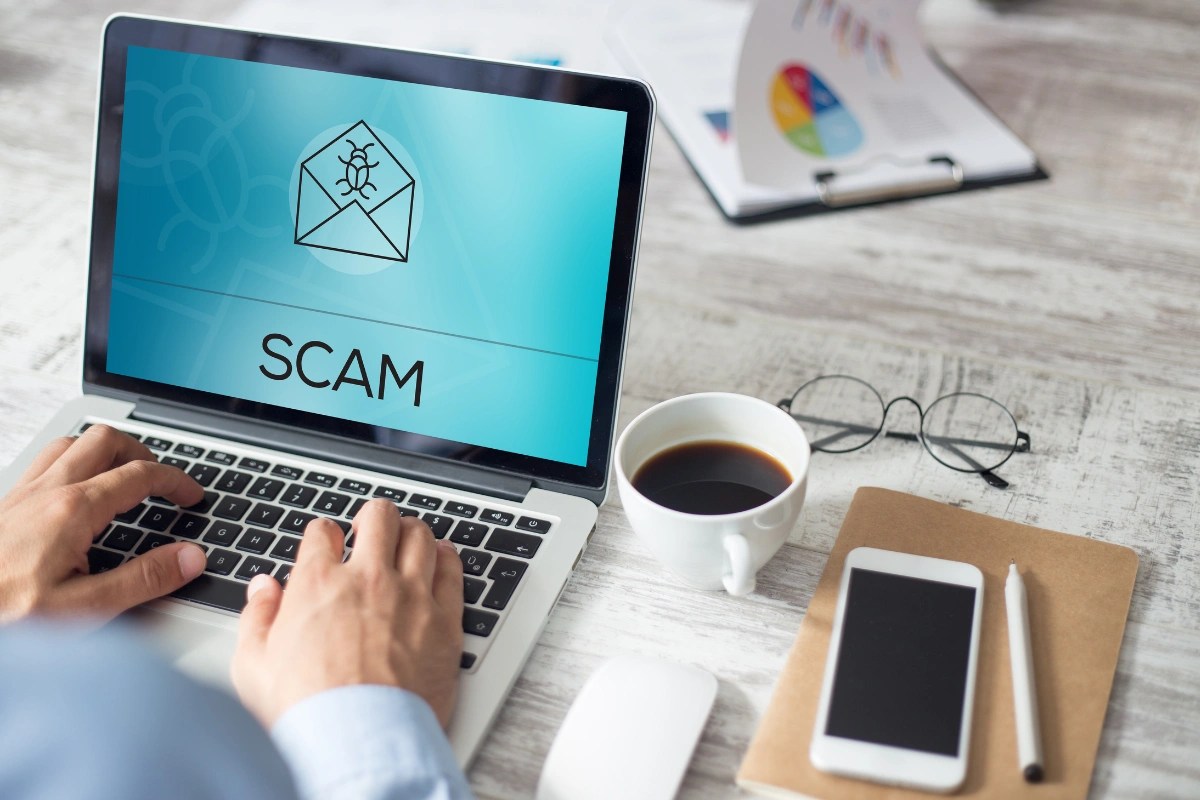Seventy-eight percent of adults in the United Statesprefer to bank onlinethan visit a physical branch in person. But due to theopen nature of the internet, online banking poses significant security risks, such as malware, phishing, and identity theft.
It's natural to worry about these risks, especially if you rely on online banking in your business. However, two-factor authentication, changing your passwords regularly, and using a password manager, among other simple steps, can keep you safe online. In this guide, get online banking security tips and learn how to securely manage your finances on the internet.
Here are five things you should know about online banking security:
- Thirty-one percent of banking customers have recently experienced data security issues, according to research
- Internet banking security risks include malware, phishing, and hacking
- You can take various steps to protect your online banking security, including checking your accounts frequently
- Changing passwords regularly, using a password manager, and being aware of scams can also reduce internet banking threats
- TeamPassword helps you manage your online banking passwords and increase internet security
Table of Contents
- How Secure Is Online Banking?
- Online Banking Risks
- Online Banking Security: 7 Tips for Securing Your Info
- 1. Choose Strong Passwords
- 2. Change Passwords Regularly
- 3. Use Two-Factor Authentication
- 4. Stay Skeptical of Scams
- 5. Use Your Financial Institution's Security Offerings
- 6. Use a Password Manager
- 7. Check Your Accounts Regularly
- Improve Your Online Banking Security With TeamPassword
- Online Banking Security FAQs
- What Is the Best Way to Protect Online Banking?
- What Is an Example of a Good Password for Online Banking?
- How Secure Is Online Banking?
How Secure Is Online Banking?
Online banking is generally safe. That's because financial institutions followstrict security protocolsto protect your information, such as 128-bit or 256-bit data encryption. However, that doesn't mean your bank account isn't at risk. Thirty-one percent of banking customers have recently had their accounts hacked, information compromised, or experienced otherdata security issues.
If you experience one of these issues, your bank should refund any fraudulent deposits from your account. The FDIC alsoprotects the moneyin your account up to a specific amount in case of a bank failure. However, you should take additional steps to keep your money safe, especially from hackers. These steps include ensuring your online bankingpasswords are safe.
Online Banking Risks
Here are some of the most common online banking security risks:
- Phishing: When someone pretending to be from your bank asks for account information such as passwords and credit card numbers via email or text.
- Hacking: When hackers break into your bank account and steal your money or change your details. Also known as account takeover (ATO).
- Identity theft: When someone steals your identity, often by hacking into your bank account, and opens up new credit accounts in your name.
- Malware: When malicious software infects your computer, allowing cybercriminals to capture your login information and other online banking credentials.
It's impossible to prevent all online security banking risks. However, many scams happen because of the way people use their accounts. For example, using the same password across different banks can increase the chances of fraud. If you're guilty of doing this, it's time tobreak this habit.
Online Banking Security: 7 Tips for Securing Your Info
Securing your online banking credentials might sound like a chore. However, it can significantly reduce the chances of a fraud event. Follow these seven tips for better banking security:
1. Choose Strong Passwords
The stronger your internet banking password, the better. That's because hackers can easily crack weak passwords and infiltrate your online accounts. Astrong passwordconsists of at least 12 random letters (upper and lowercase), numbers, and special characters such as the "$" symbol.
Passphrases— strings of words that form a memorable phrase — are effective passwords if done correctly. However, hackers will guess famous quotes, sayings, and lyrics.
2. Change Passwords Regularly
Changing your passwords, preferably every few months, will limit the amount of time hackers can access your account if they already have your credentials. Apassword generator, such as the one offered by TeamPassword, can help you with this. It automatically generates random passwords, simplifying the password creation process. Creating strong and unique passwords forevery one of your accountsis the best way to prevent an attack.
3. Use Two-Factor Authentication
Two-factor authentication(2FA) provides an additional layer of protection for banking online. It requires you to confirm your identity twice before accessing your account. For example, entering your login information and a security code from a text message on your bank's website. Some banks require you to set up 2FA before using your online account. However, others give you the option to enable 2FA in your account settings. This process involves linking your account to an additional electronic authentication method, such as your phone.
4. Stay Skeptical of Scams
Commononline banking scamsinclude phishing attacks, social engineering, and password cracking — when hackers guess your password with nefarious technology. Fraudsters can also steal your information if you log into your bank account over an unstable public Wi-Fi connection. It's critical to be aware of the latest scams and look for any red flags that suggest your security is at risk. For example, if you receive a suspicious-looking email from someone purporting to be from your bank, don't click on any links in the message. Instead, reach out to your financial institution to confirm the email is genuine.
5. Use Your Financial Institution's Security Offerings
Banks often provide security features that can keep you safe online. For instance, text alerts if the institution suspects suspicious activity on your account. You might have to opt into these features in your account settings or talk to someone from your bank about setting them up. Whatever the process is, you must use all of your institution's security offerings to protect yourself on the internet.
6. Use a Password Manager
You likely use multiple passwords for different online accounts, including your bank accounts. Using apassword manageris the safest way to store and protect all your credentials for various internet services. It keeps your passwords in one secure place so you don't have to remember them.
TeamPassword's Password Manager lets you create, manage, and access passwords across the internet on your computer or mobile devices.Featuresinclude activity logging, 2FA,secure encryption technology, and the ability to share credentials with groups. You can create strong and unique passwords for all your accounts, which provides peace of mind on the internet.
7. Check Your Accounts Regularly
Checking your bank accounts online at frequent intervals will help you identify any fraudulent transactions. You can flag these charges with your institution and get your money back. Aim to check your accounts every 1-2 weeks to look for unauthorized activity. If fraud has taken place, you'll need to change your online banking password immediately.
Improve Your Online Banking Security With TeamPassword
There are multiple online banking security risks you need to know about. However, you can reduce these risks by protecting your information online. Following the seven tips above can decrease the chances of a fraud event.
TeamPassword can also help you reduce online banking fraud. For example, our Password Manager lets you create, store, and access strong passwords for your online bank accounts in one place, making it harder for hackers to steal your credentials.Try TeamPasswordand start protecting your business now.
Online Banking Security FAQs
What Is the Best Way to Protect Online Banking?
The best way to protect your credentials is to follow the seven online banking security tips listed above. These tips are:
- Choose strong passwords
- Change passwords regularly
- Use two-factor authentication
- Stay skeptical of scams
- Use your financial institution's security offerings
- Use a password manager
- Check your accounts regularly
What Is an Example of a Good Password for Online Banking?
A good password consists of at least 12 random letters, numbers, and special characters. For even better security, use a combination of lower and upper case letters. Here are some examples of good passwords:
- Ju!4hPONg&u1
- PP9*g5nW91%H
- J&"Hfwp01H£n
While online banking is generally safe, your business could still be at risk of a fraud event. Take a little time to protect your information online and invest in a password manager to make your life easier. After safeguarding your bank accounts, consider securing your other online accounts, including social media profiles.


